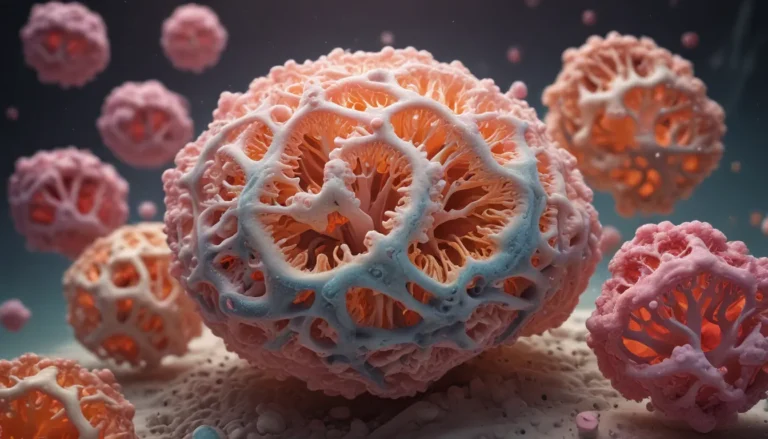A Note About Images: The images used in our articles are for illustration purposes only and may not exactly match the content. They are meant to engage readers, but the text should be relied upon for accurate information.
Metabolomics, a captivating field of study, delves into the intricate world of cellular metabolism, providing valuable insights into the chemical processes within our cells. In recent years, metabolomics has gained significant attention for its potential applications in disease mechanisms, drug metabolism, personalized medicine, nutrition, and environmental impacts on the body. This article will explore 19 surprising facts about metabolomics, shedding light on its importance and diverse applications.
Key Takeaways:
- Metabolomics studies small molecules in living organisms, offering insights into diseases, personalized medicine, agriculture, and environmental conservation.
- By analyzing chemical fingerprints, metabolomics can detect diseases early, aid in drug development, and even identify doping in sports.
- With endless possibilities, metabolomics is a rapidly evolving field at the forefront of cutting-edge research.
The Fascinating World of Metabolomics
Metabolomics focuses on analyzing the chemical fingerprints left behind by cellular processes, providing valuable insights into the metabolism of organisms. This field plays a crucial role in understanding various diseases by examining the metabolic profiles of individuals, aiding in the identification and diagnosis of conditions such as cancer, diabetes, and metabolic disorders. Moreover, metabolomics offers personalized medicine possibilities by analyzing an individual’s unique metabolic signature and developing tailored treatment plans.
Applications in Various Fields
Metabolomics has diverse applications in different fields, including:
- Early Disease Detection: Metabolomics can identify biomarkers indicating the presence of diseases before symptoms manifest, allowing for early intervention and improved patient outcomes.
- Drug Development: By studying the metabolic effects of drugs, metabolomics contributes to the discovery and optimization of therapeutic agents.
- Nutritional Research: Scientists use metabolomics to assess the impact of diets and nutrients on an individual’s metabolism, leading to personalized dietary recommendations.
- Forensic Investigations: Metabolomics provides valuable evidence in forensic cases by analyzing metabolic markers to determine causes of death and identify toxic substances.
- Environmental Science: Metabolomics helps in assessing the impact of pollutants on organisms and ecosystems, guiding conservation efforts.
- Agricultural Practices: By studying the metabolic profiles of crops and livestock, metabolomics contributes to sustainable agricultural methods and improved crop yields.
Advancements and Future Prospects
Metabolomics is a constantly evolving field, with advancements in technology and analytical techniques expanding its capabilities. These advancements open up new avenues for understanding cellular processes, discovering biomarkers, and gaining comprehensive insights into biological systems. By combining metabolomic data with other omics technologies, scientists can deepen their understanding of metabolism and its implications across various fields.
FAQs About Metabolomics
-
What is metabolomics?
Metabolomics is the study of small molecules called metabolites within biological systems, offering insights into metabolic processes and their influences. -
How is metabolomics different from genomics and proteomics?
While genomics focuses on an organism’s complete DNA and proteomics analyzes all proteins, metabolomics examines metabolites and provides insights into cellular metabolism. -
What are the applications of metabolomics?
Metabolomics has diverse applications in disease diagnosis, drug discovery, personalized medicine, agriculture, environmental science, and nutrition. -
How is metabolomics data analyzed?
Metabolomics data analysis involves statistical analysis, multivariate analysis, and pathway analysis to identify metabolites, understand metabolic pathways, and correlate changes with biological processes. -
What are some challenges in metabolomics research?
Challenges in metabolomics research include sample preparation, data analysis, metabolite identification, and standardization of methodologies, requiring advanced computational tools and data integration. -
How can metabolomics contribute to personalized medicine?
Metabolomics provides valuable information about an individual’s metabolic profile, aiding in personalized medical treatments, predicting drug responses, and developing targeted therapies. -
What are the future prospects of metabolomics?
The future of metabolomics is promising, with advancements in technology, data analysis, and integration with other omics fields, leading to better understanding of cellular processes and disease diagnosis.
Discovering the Intricacies of Metabolomics
As we unravel the mysteries of metabolomics, we encounter a field brimming with potential and possibilities. From early disease detection to personalized medicine and environmental conservation, metabolomics offers a window into the intricate world of metabolism. By continuing to advance in technology and research, metabolomics is poised to transform healthcare, agriculture, and environmental science, shaping the way we understand and approach various challenges.
With each new discovery and breakthrough, the field of metabolomics paves the way for innovative solutions and insights that bridge the gap between biological systems and practical applications. As we journey further into the realm of metabolomics, we can expect surprises, revelations, and invaluable contributions to our understanding of health, disease, and the complex web of metabolic processes that sustain life.






